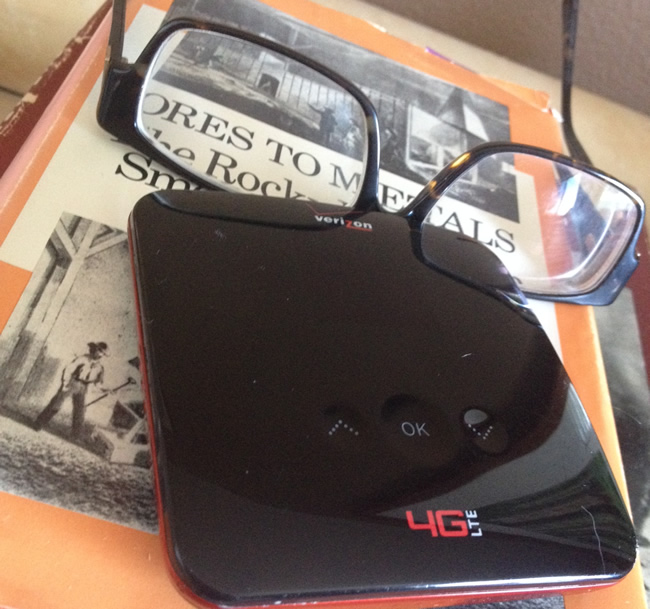When I travel, I never leave home without it. I’m not speaking of my American Express card, because I don’t own one. No, I’m referring to my Verizon 4G LTE ZTE (I might as well just put ABCDEFG for all I understand about the letters) portable broadband, also known as a hot spot (this differs from the Urban Dictionary’s definition of a ‘hotspot’).
Together, my WIFI and I have logged something close to 40,000 miles together. From California to the New York islands its connectivity has allowed me to carry on my noble task of posting jeeps to eWillys and answering emails. No mountain pass has been too tall (though a couple have been too remote) and no desert too barren (ok, that might not be true either, but close enough) to keep it from working. It’s one of my best friends, which might be considered kind of sad upon further review. That’s something to bring up with my shrink I suppose …
In fact, I haven’t had to travel off the beaten path much to appreciate my hotspot’s value. I can’t tell you the numerous motels and hotels that have lacked reasonable functioning ‘free’ WIFI. It’s amazing how many nice hotels have lousy — read entirely unusable — ‘free WIFI’ and also supply paid WIFI upgrades for better service.
In fact, during our March/April trip through the western states the best hotel WIFI I found was at, of all places, the Wigwam Motel in San Bernardino. It was quick, responsive, and omni-present. In fact, the nicer the hotel, the worse the free WIFI seemed to be. Thankfully, my hotspot allowed eWillys operations to continue, though there were a few times at hotels my normally dependable hotspot acted unusually slow. Perhaps now I understand why . . .
The reason I bring up this topic, is because I just read an article about Marriott’s attempts to block personal hotspots in their hotels. According to this PC World article,
Marriott has agreed to pay a $600,000 fine after the Federal Communications Commission found the company blocked consumer Wi-Fi networks last year during an event at a hotel and conference center in Nashville. At the same time, Marriott was charging exhibitors and others as much as $1,000 per device to access the hotel’s wireless network, the FCC announced Friday.
But, Marriott wasn’t using a jammer to block signals. They were using their own WIFI network to block personal hotspots. Moreover, the company was unlawfully blocking WIFI frequencies they neither own nor have the right to manage, frequencies the FCC provides for me, and you, and my friend to email, web surf, movie watch, or read eWillys.
As a comparative analogy, it’s little different than the Marriott blocking traffic on the road in front of their hotel, then allowing only cars that pay the Marriott fee to drive on it. Naturally, in that scenario, they are keeping out the rogue cars, which makes it safer for their guests. I’m pretty sure the DOT would have some issues with that!
Despite the fine, Marriott continues to believe they were acting lawfully. Naturally, Marriott claims it was doing this for our own benefit, to protect us naive users from those ‘rogue’ wireless hot spots that degrade service, steal identities and lead insidious cyber-attacks. And, of course, It had nothing to with generating income from patrons. Besides, EVERYONE knows how safe corporate WIFI systems and networks are. Just ask JP Morgan, Target, etc . . .
So, the next time you are at a hotel and your personal hotspot stops working, there’s probably a rogue corporate network at work unlawfully pirating your FCC-given right to use frequencies you’ve paid to use. Instead of some Russian-criminal-nerd trying to steal money from your bank account, it’s someone in the hotel blocking your service so they can steal $13 or more from your wallet for WIFI. It’s an employee from the same hotel whose corporate values likely include phrases like “We Act With Integrity” & “We Put People First”.
That’s all for now.


I just got back from a cruise – WIFI was available for a fee. I elected for the 60 min $29 plan. Glad I didn’t pay for more, it was a slowest thing since my original 1980s dial-up. You won’t get any work done on a ship so plan ahead if think you are going to cruise to Alaska to see all the those jeeps
I think when someone comes out with “WILLYSMAN” Comix [defender of free WIFI and other liberties we all deserve] Dave should be the gentleman in the cape and boots protecting truth, justice and the four wheel way. What say you, folks ? Sorry, Dave, couldn’t resist, too good an opening.
Challenge accepted! Actually, sounds like it should be this year’s Halloween costume 🙂
David, I’m with you on the hotel WiFi sucking. I’ve been on the road a lot for work and can tell you that most hotel WiFi is just bad. Last one I used I had to stand by the door of my room to use! I just got an iPhone 6 and can put out my own network with it, so I’ll be using that on the road the next few months.
I am a high school teacher and got frustrated with the kids always trying to text each other and surf the web on their cell phones during class and in between class. I looked into buying a jammer for my classroom but was told by our district solicitor that it was illegal for me to do that as it is theft of service. The students, or their parents, are paying for access to the Internet via the 4G wifi signal. If I block that I am stealing their service. Still not sure if the pro lem is technology or attorneys?
Dave,
Yours is by far the most eloquent objection to the Marriott abuse that I have seen. Thank you for composing and posting it. I, too have had really slow hotel WiFi and advertised WiFi that didn’t make it to my room. Or WiFi that was too inscrutable to figure out how to connect to. Or that immediately tried to hack my device.
I do have to say that I abandoned my Verizon 4G hotspot because it would log off prematurely if left unattended and the display could not be read unless you were in a dark room. I got tired of rebooting it in a dark room.
Rich: I can only imagine how difficult it is to keep students’ hands off their phones/devices. You have my sympathies!
Doug: Thanks. Did you ever try having it replaced? Our first 3G one was pretty good and this latest one has been better. Maybe we’ve just been fortunate.
@Rich P,
Wifi jammers / cell phone jammers are against US federal law. But, I’m from Taiwan and we manufacture them over here. They’re awesome. Simply turn it on and no one within the room can access a cell signal or wifi, etc. I used to make students put their phones into the “cell phone box” on my desk upon entry into the classroom and they could have them at the end of class. Now, it’s unnecessary. I simply flip the switch on and no more touchy touchy their phones, etc. Awesome.
Cody
It that’s not a good reason to teach abroad, I don’t know what is! 🙂